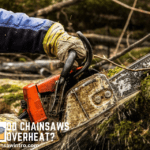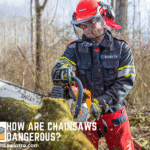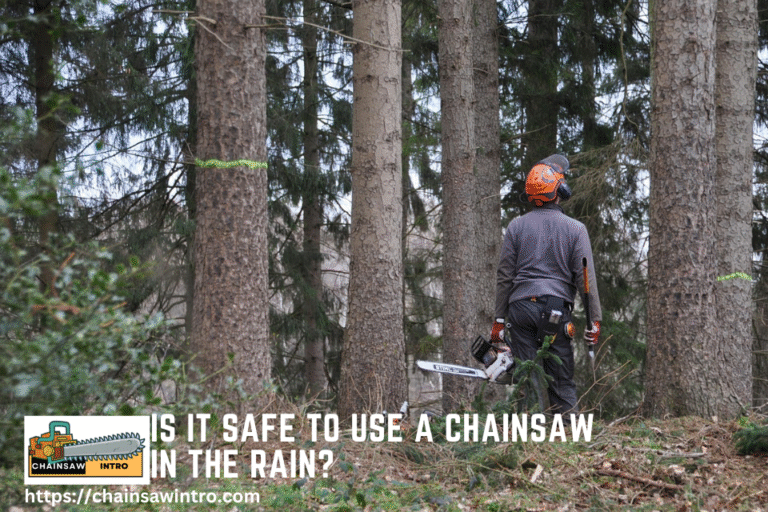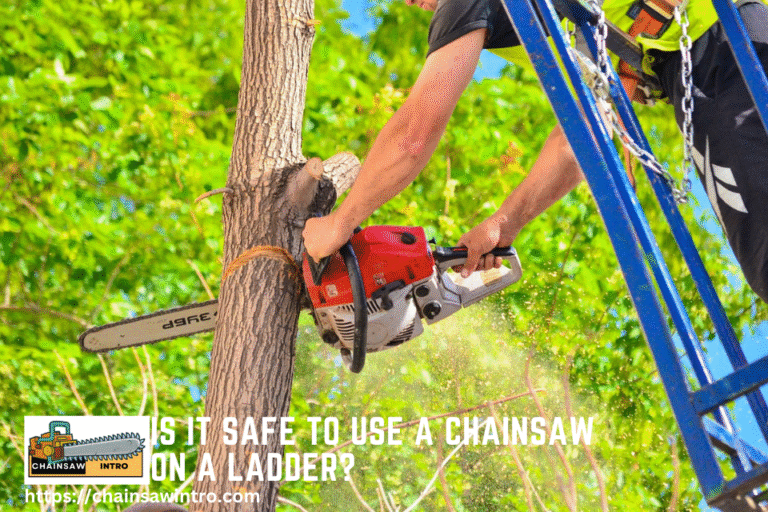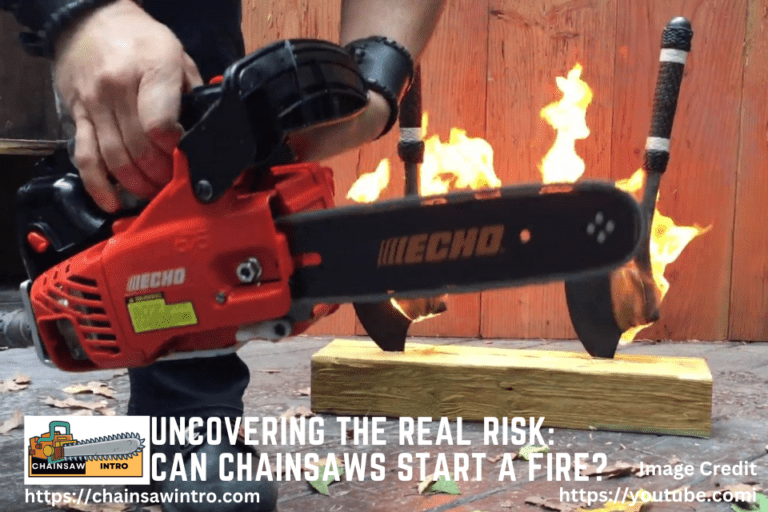Chainsaws are powerful outdoor tools, and since they’re often used in unpredictable weather, it’s common to wonder: what happens if a chainsaw gets wet? Whether you’re cutting wood in the rain, dealing with wet logs, or accidentally leaving your saw outside overnight, moisture can have a real impact on your chainsaw’s performance and longevity. While most chainsaws can handle light moisture, prolonged exposure to water can cause rust, electrical issues, or even damage the engine.
In this guide, we’ll explore how water affects chainsaws, what to do if yours gets wet, and how to protect it from long-term damage.
How to fix a flooded STIHL Chainsaw Engine
Can a Chainsaw Get Wet?
Yes, a chainsaw can get wet, but how much water it’s exposed to makes the difference. Light rain, damp wood, or morning dew usually won’t cause immediate problems. Chainsaws are built for outdoor use, so a little moisture is expected. However:
- Gas chainsaws can suffer from water entering the fuel system, carburetor, or air filter.
- Electric chainsaws (corded and battery-powered) are more vulnerable, since water can cause short circuits or battery failure.
- Metal parts such as the bar, chain, and sprocket are prone to rust when exposed to water.
How Water Affects Chainsaw Components: The Basics?
Water exposure can impact various parts of a chainsaw, depending on its type (gas or battery-powered) and the extent of the exposure. For gas-powered chainsaws, the engine, air filter, and fuel system are most vulnerable. Water in the fuel tank or carburetor can disrupt combustion, leading to hard starting or stalling. A soaked air filter reduces airflow, causing poor performance or engine flooding. The clutch and chain brake, often exposed, may rust if not dried promptly, affecting their operation.
Battery-powered chainsaws face different risks. Water ingress into the battery compartment or motor housing can cause electrical shorts, corrosion, or complete failure of electronic components. While many modern models (e.g., STIHL or EGO) feature weather-resistant designs, they’re rarely fully waterproof, and prolonged exposure can still cause issues. The chain and bar, common to both types, are less affected by water alone but can rust if left wet, especially if debris like sawdust clogs the bar groove. Understanding these vulnerabilities helps assess the severity of water exposure and guides proper recovery steps.
What Happens If a Gas Chainsaw Gets Wet?
If a gas chainsaw gets wet, the most common problems include:
- Moisture in the fuel system – Water in the gas tank or carburetor can prevent the engine from starting.
- Rust on the bar and chain – Exposure to rain or snow accelerates corrosion.
- Air filter clogging – A wet air filter restricts airflow, reducing power and efficiency.
- Starting problems – Wet spark plugs may cause misfires or failure to start.
If your gas chainsaw has been exposed to water, it’s important to dry the chain, drain contaminated fuel, and check the air filter before using it again.

What Happens If an Electric Chainsaw Gets Wet?
Electric chainsaws are more sensitive to moisture than gas-powered models.
- Corded chainsaws should never be used in the rain, as water can cause electrical shorts or even shock hazards.
- Battery-powered chainsaws may survive light dampness, but if water enters the battery compartment, it can cause corrosion or complete battery failure.
For electric saws, even brief exposure to water requires immediate drying and inspection before use.
Does Rain Damage a Chainsaw?
Light rain won’t instantly destroy your chainsaw, but consistent exposure to wet conditions shortens its lifespan. Here’s what happens:
- Rain increases the chance of rust on the bar, chain, and sprocket.
- Water can wash away bar oil, causing increased friction and wear.
- Sawdust mixed with water becomes a sticky sludge that clogs the chain, sprocket, and housing.
- Extended rain exposure can soak into gaskets and seals, weakening them over time.
If you’re caught cutting in the rain, it’s best to stop, wipe down the saw, and oil the chain before storing it.
Can You Use a Chainsaw in the Rain?
Technically, yes—you can use a gas chainsaw in the rain, but it isn’t recommended. The moisture makes the chainsaw harder to maintain and increases the risk of slipping accidents. For electric chainsaws, using them in the rain is unsafe and should always be avoided.
If you absolutely must cut in wet conditions:
- Use a sharp chain to reduce strain.
- Keep the saw as dry as possible with a cover when not in use.
- Wipe and oil the chain immediately after cutting.
How to Protect Your Chainsaw From Water Damage
Prevention is always better than repair. Here are maintenance tips to protect your chainsaw:
- Store properly – Keep your chainsaw in a dry, covered place when not in use.
- Use protective cases or covers – A chainsaw case shields against rain and dampness.
- Oil the chain regularly – Proper lubrication prevents rust buildup.
- Avoid cutting in heavy rain or snow – This reduces long-term wear and potential hazards.
- Check for rust – Inspect the bar
Conclusion | Safeguarding Your Chainsaw Against Water
So, what happens if a chainsaw gets wet? A little moisture from wet logs or light rain usually won’t dull the chain, but prolonged exposure to water can cause rust, starting problems, and even permanent damage—especially for electric models. Gas chainsaws are more resilient, but they still need proper drying, oiling, and fuel inspection if exposed to water.
By cleaning your chainsaw after every use, storing it correctly, and avoiding use in heavy rain, you can keep your tool reliable and extend its lifespan.
Frequently Asked Questions
Can a chainsaw get wet?
Yes, chainsaws can get wet, but the level of exposure matters. Light rain or dew usually won’t damage a gas chainsaw, but prolonged moisture can cause rust and mechanical issues. Electric chainsaws are more sensitive and can short circuit if exposed to water.
What happens if a gas chainsaw gets wet?
Water can affect the fuel system, air filter, and spark plug, making the chainsaw harder to start. Moisture on the bar and chain can also cause rust if not cleaned and oiled afterward.
Can I use a chainsaw in the rain?
It’s possible to use a gas chainsaw in light rain, but it’s not recommended due to safety risks and potential wear. Electric chainsaws should never be used in the rain due to the risk of electric shock.
How do I dry a chainsaw after it gets wet?
Wipe down all parts, remove the battery or spark plug, dry the chain and bar, and reapply bar oil. For gas chainsaws, also check the fuel system and air filter before restarting.
Does wet wood damage a chainsaw?
Wet wood itself doesn’t dull the chain, but it can create sticky sawdust that clogs the chain and bar, and prolonged moisture may lead to rust if maintenance is neglected.
How can I protect my chainsaw from water damage?
Store it in a dry, covered place, use a protective case, oil the chain regularly, and avoid cutting in heavy rain. Regular maintenance after wet use ensures long-term performance.
Does It Hurt a Chainsaw to Get Rained On?
No, it does not hurt a chainsaw to get rained on. In fact, it is actually beneficial for the chainsaw as the rain will help to keep the chain and bar lubricated.
Is It Ok If a Chainsaw Gets Wet?
No, it is not okay if a chainsaw gets wet. Water can damage the engine and electrical components of the saw. It can also cause the chain to rust and deteriorate.
How Do You Start a Wet Chainsaw?
There are a few things you need to do before starting a wet chainsaw. First, make sure the saw is properly lubricated. Second, clear the area around the saw of any debris that could get caught in the chain.
Finally, start the saw with a slow and steady motion to avoid kickback.
I’m a chainsaw expert with over 8 years of hands-on experience in forestry, landscaping, and property maintenance. Over the years, I’ve worked with top brands like Stihl, Husqvarna, and Oregon, and I’m certified in chainsaw safety and maintenance practices. My goal is to share practical guides, honest reviews, and proven safety tips to help homeowners, DIYers, and professionals use chainsaws more effectively and confidently.



